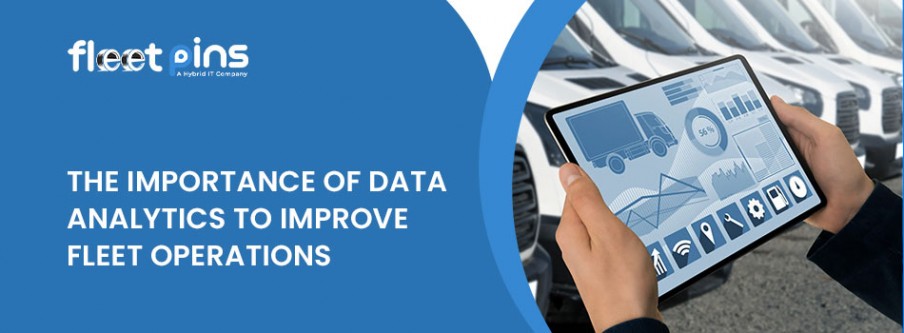
- On 2025-02-14
The Importance of Data Analytics to Improve Fleet Operations.
If you manage a fleet of vehicles, you know how challenging it can be. To simplify fleet management and boost safety, consider integrating our Fleet Dash Cam into your vehicles. With so many factors to track, like fuel consumption, driver behavior, and vehicle maintenance, it’s crucial to have the right tools in place.
It can be overwhelming, to say the least. However, there is a solution—fleet data analytics. This can make your life easier. At Fleet Pins, we will explore the role of using data analytics to optimize fleet management. We will also look into the benefits of data analytics in fleet management.
What is Fleet Management?
Fleet management is the backbone of efficient transportation and logistics. It involves managing and maximizing a company's fleet of vehicles. This task is challenging due to the variety of vehicles. They all have different maintenance needs and operational difficulties.
Technical Insights of Fleet Composition
Each vehicle may demand specific maintenance types and regularity. Understanding each vehicle's needs is vital. That’s why you need to understand the technical aspects of your fleet. Categorize vehicles by:
- Type
- Make
- Model
- Age
- Usage
The Importance of Data Analytics
Data analytics in fleet operations is the cornerstone of modern fleet management. For more on how data can enhance fleet operations, read How GPS Vehicle Tracking Can Transform Fleet Management.
It involves examining and interpreting data to gain valuable insights. It's about understanding and turning vehicle needs into actionable processes.
Data Collection and Sources
Fleet performance analytics systems gather data from various sources. These sources include:
- Telematics systems
- GPS devices
- IoT sensors
- External data (e.g., traffic and weather reports)
This helps you stay on top of critical data points, such as:
- Vehicle location
- Speed
- Fuel consumption
- Engine diagnostics
The Core Role of Data Analytics in Fleet Operations
Data analytics serves as the driving force that fuels informed decision-making. It acts as the bridge between raw data and actionable insights. It offers the potential to revolutionize operations, minimize downtime, and reduce costs. Each minute of vehicle downtime impacts your bottom line.
By utilizing data from multiple sources, you gain valuable insights. You can see the performance of both your vehicles and their drivers. Fleet optimization through data lets you take a proactive approach. It includes identifying potential issues before they escalate into expensive problems.
Predictive maintenance models use historical data and advanced algorithms. They forecast when vehicle components might fail. This allows you to plan maintenance strategically and use professional services.
Data analytics drills down into areas like:
- Fuel consumption
- Route optimization
- Driver behavior analysis
- Vehicle maintenance
- Engine performance
- Real-time traffic conditions
This information helps recommend optimal routes, driving patterns, and maintenance procedures. This lowers costs and improves safety. For more on tracking your fleet’s fuel usage, read Benefits of Dash Cams for Fleet Vehicles.
Data analytics isn't just a tool. It is the heartbeat of modern fleet management. It transforms data into smarter, more efficient, and cost-effective decisions.
Benefits of Data Analytics in Fleet Management
The technical effectiveness of data analytics translates into significant advantages. It benefits fleet managers and heavy-duty diesel repair shops. By aggregating data from various sources, you can optimize your operations.
- Improved decision-making: Metrics like fuel consumption help you identify inefficient vehicles. You can schedule maintenance or replace them with more fuel-efficient ones.
- Increased efficiency: Analyzing vehicle usage data helps you identify underutilized vehicles. You can optimize their usage, reducing costs and increasing efficiency.
- Enhanced safety: You can identify speeding, harsh braking, and other risky driving behaviors. Addressing these issues can improve safety and reduce accidents.
- Better maintenance: Understanding exactly what your fleet needs helps streamline repairs and minimize downtime.
- Predictive maintenance: Historical data and machine learning help forecast component failure. By catching issues before they occur, you can optimize schedules and avoid unnecessary repairs.
- Fuel management: Fuel management software helps fleet managers monitor fuel consumption. It reduces costs. Analyzing data on fuel consumption helps identify inefficient vehicles. You can then implement strategies to reduce fuel consumption.
- Route optimization: Route optimization software helps reduce travel time. Analyzing data on traffic patterns and road conditions helps identify the most efficient routes. To learn more about optimizing your fleet’s route planning, check out Top Benefits of Implementing GPS Trackers in Fleet Operations.
Future Trends in Fleet Management Analytics
Here are some trends in fleet performance analytics that could become commonplace among fleet managers:
- Reducing latency with edge computing: Edge devices at the vehicle level will enable faster data analysis for tasks like collision avoidance and driver assistance systems.
- The 5G revolution: The adoption of 5G networks will allow faster data transmission between vehicles and central systems. Low-latency 5G connections will enhance real-time tracking and data analytics.
- Ensuring data integrity with blockchain: Blockchain technology will verify the integrity of data related to
- Vehicle maintenance records
- Driver behavior
- Supply chain management
- Augmented reality in fleet maintenance: AR will provide mechanics with real-time data overlays during repairs. AR glasses will display vehicle schematics, maintenance instructions, and diagnostic data. This will improve efficiency and reduce errors.
- The future of optimization: Quantum computers will solve complex optimization problems faster than traditional computers.
- Green fleet management: IoT sensors and advanced analytics will enable precise emissions measurement. Green fleet management will help develop eco-friendly routing strategies.
Conclusion
In this era of data-driven fleet management, heavy-duty diesel repair shops and fleet managers have a critical choice. Embrace advanced data analytics, and you'll enhance efficiency, reduce costs, and move toward a greener future. Ignore these technologies, and you’ll be left behind.
The future of fleet management is here, driven by data. Are you ready to step into tomorrow?




